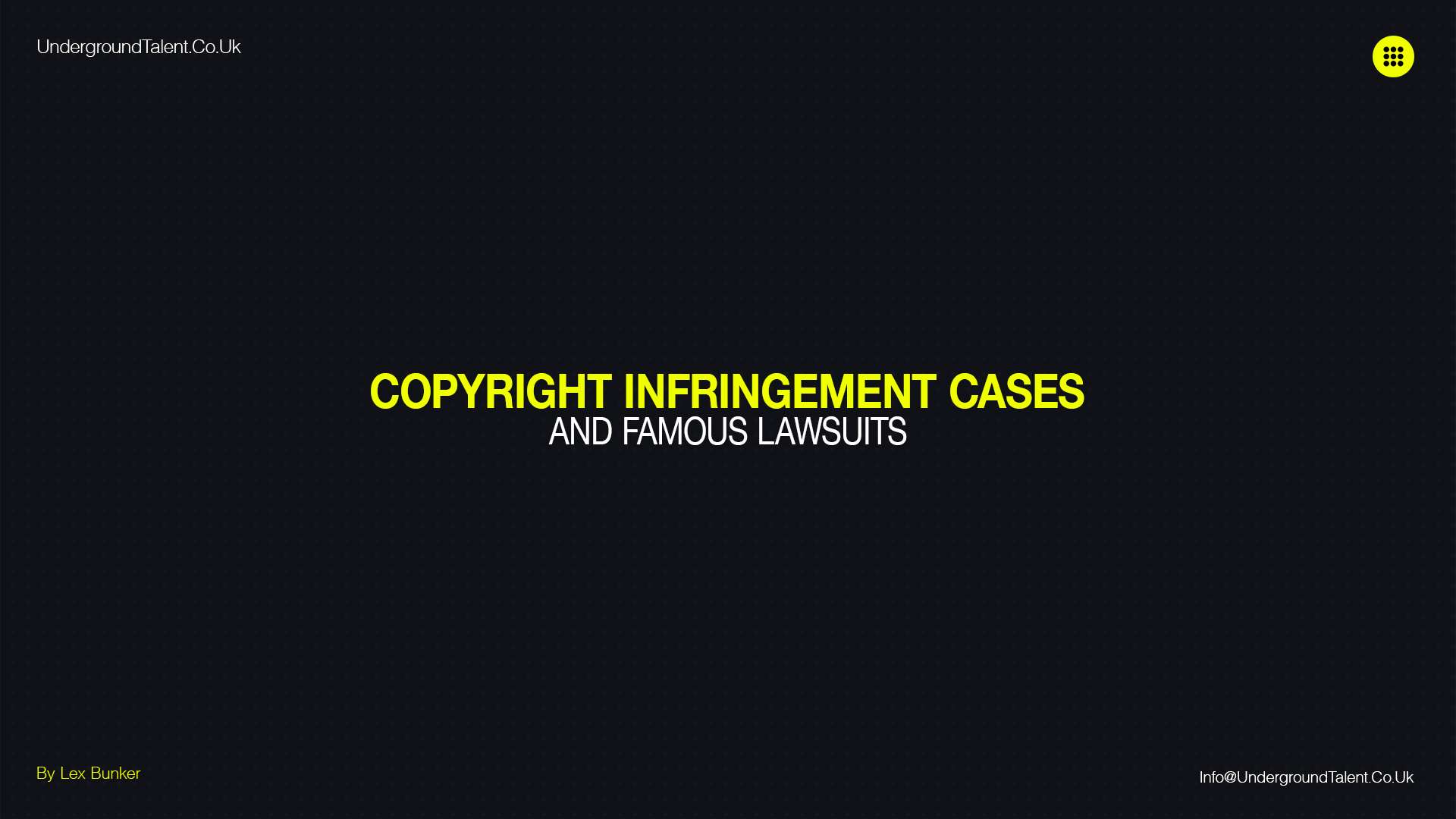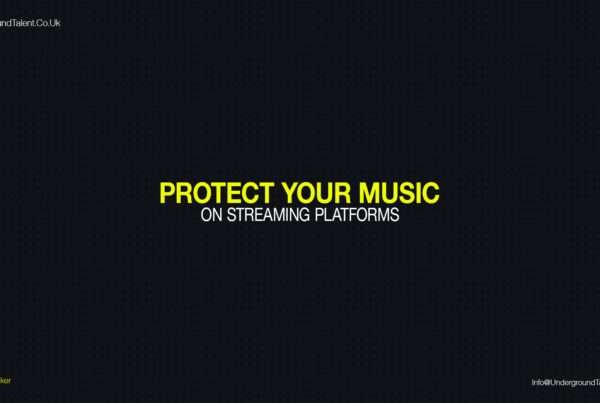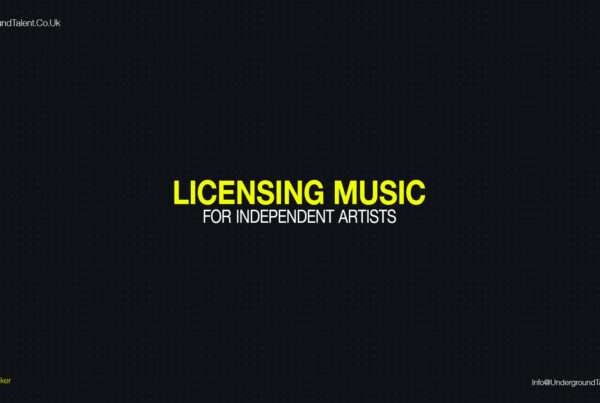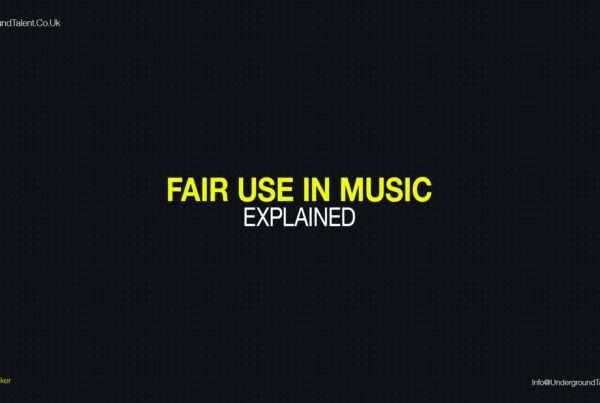Music copyright infringement cases often make headlines involving some of the biggest names in the industry. These legal battles can shape the future of music and copyright law. Here we explore significant cases that have left a mark on the music world, including key disputes in the techno music genre.
Table of Contents | Music Copyright Infringement Cases
- Introduction
- Key Takeaways
- Led Zeppelin vs. Spirit
- Robin Thicke vs. Marvin Gaye Estate
- Ed Sheeran vs. Matt Cardle
- Beyoncé vs. Ahmad Javon Lane
- Pharrell Williams vs. Bridgeport Music
- Underground Resistance vs. Sony and BMG
- Carl Craig vs. Various Artists
- Kraftwerk vs. Moses Pelham
- Conclusion
- Frequently Asked Questions
Introduction to Music Copyright Infringement Cases and Famous Lawsuits
Music is a universal language that transcends borders and cultures, evoking emotions and creating memories. However, the line between inspiration and imitation can often become blurred, leading to contentious legal battles over copyright infringement.
In the high-stakes world of music, where a single hit can generate millions of dollars, the protection of intellectual property is paramount.
This article delves into some of the most significant copyright infringement cases in the music industry, exploring the legal intricacies and implications of each dispute. From rock legends to techno pioneers, these cases highlight the ongoing struggle to balance creativity with legal boundaries.
Key Takeaways
- Understanding the fine line between inspiration and copying is crucial in the music industry.
- Court rulings can set important precedents for future copyright cases.
- Public and critical reception can influence the outcomes of these cases.
- Legal battles can be lengthy and costly for all parties involved.
- Copyright laws continue to evolve with new cases and technological advancements.
Music Copyright Infringement Cases and Famous Lawsuits

Led Zeppelin vs. Spirit
Stairway to Heaven Lawsuit
Led Zeppelin faced a major lawsuit when the band Spirit claimed that the iconic opening riff of “Stairway to Heaven” was copied from their 1968 song “Taurus.” The case was filed in 2014 by the estate of Randy Wolfe, Spirit’s late guitarist. Led Zeppelin did have access to “Taurus” as the two bands had performed together in the past.
Musical Similarities
The lawsuit centred on the similarities between the two songs, particularly the guitar riffs. Jimmy Page, Led Zeppelin’s guitarist, admitted in court that he owned the Spirit album featuring “Taurus.” Despite this, the case was complex, involving deep dives into music theory and harmonic movement.
Court Verdict
In 2016, the court ruled that the songs were not substantially similar. An appeals court reviewed the case in 2018, but the original verdict was upheld in 2020. The U.S. Supreme Court later refused to hear the case, officially ending the legal battle.
Robin Thicke vs. Marvin Gaye Estate
Blurred Lines Lawsuit
In 2013, Robin Thicke and Pharrell Williams released the hit song “Blurred Lines.” The estate of the late Marvin Gaye noticed similarities to Gaye’s 1977 classic “Got to Give it Up” and filed a copyright infringement case in 2014. The lawsuit claimed that “Blurred Lines” used the same instrumentation and feel as Gaye’s original song.
Copyright Infringement Claims
The case was not about direct plagiarism of lyrics or sheet music. Instead, it focused on the overall vibe and groove of the songs. Thicke and Williams had tried to negotiate with Gaye’s estate, but talks failed. Hoping to resolve the issue quickly, Thicke and Williams initiated legal proceedings themselves.
Settlement Details
After a lengthy legal battle, the court ruled in favour of Marvin Gaye’s estate. They were awarded $5 million in damages. This case became one of the most controversial copyright cases in music history.
Ed Sheeran vs. Matt Cardle
Similar Melodies Dispute
Ed Sheeran faced a $20 million lawsuit for allegedly copying another song for his hit single “Photograph.” The plaintiffs claimed that Sheeran’s song was a “verbatim note-for-note copying” of Matt Cardle’s track. This case quickly became one of the most talked-about legal battles in the music industry.
Court Proceedings
The lawsuit was filed in 2017 and the trial included a legal team with civil rights attorney Benjamin Crump. During the trial, the plaintiffs played a recording of Sheeran mixing “Let’s Get It On” with “Thinking Out Loud” at a concert, calling it a “smoking gun.” Sheeran defended himself by saying he often mixes songs at gigs and that many songs share similar chords.
Resolution
The jury decided that “Thinking Out Loud” is an independent creation and did not copy “Let’s Get It On.” The verdict was a relief for Sheeran, who argued that if he had copied the song, he wouldn’t have performed it in front of thousands of people.
Beyoncé vs. Ahmad Javon Lane
Formation Lawsuit
In 2015, Ahmad Javon Lane filed a lawsuit against Beyoncé, claiming that her song “Formation” copied his track “X.O.X.O.”. Lane alleged that Beyoncé’s song had significant similarities to his work, particularly in the melody and lyrics. This case quickly gained attention due to the high-profile nature of the artists involved.
Plagiarism Allegations
Lane’s accusations centred around the idea that Beyoncé had used his song without permission. He pointed out specific parts of “Formation” that he believed were directly lifted from “X.O.X.O.”. The allegations were serious as they suggested a blatant disregard for copyright laws. Beyoncé’s legal team, however, argued that any similarities were purely coincidental and that “Formation” was an original creation.
Legal Battle Outcome
The court ultimately ruled in favour of Beyoncé, stating that there was not enough evidence to prove that she had copied Lane’s song. The judge noted that while there were some similarities, they were not substantial enough to constitute copyright infringement. This verdict was a significant win for Beyoncé and highlighted the challenges of proving plagiarism in the music industry.
Pharrell Williams vs. Bridgeport Music
Happy Lawsuit
Pharrell Williams faced a lawsuit over his hit song “Happy.” Bridgeport Music claimed that the song used elements from their track without permission. This case drew a lot of attention in the entertainment law world.
Sampling Controversy
The main issue was whether Williams had sampled parts of Bridgeport Music’s song. Sampling without permission can lead to serious legal trouble. Both sides presented their arguments, with experts weighing in on the similarities between the tracks.
Fair Use Ruling
In the end, the court had to decide if Williams’ use of the music was fair use. The verdict was closely watched by many in the music industry. The court’s decision set a precedent for future cases involving sampling and copyright infringement.
Underground Resistance vs. Sony and BMG (1999-2000)
Legal Battle
Underground Resistance (UR), a renowned Detroit-based techno label, faced a legal battle with major record labels Sony and BMG. UR claimed that these labels used their tracks without proper authorization. This case underscored the challenges smaller, independent labels face when protecting their intellectual property against larger corporations. Learn more about how to copyright your music and the importance of performance rights organizations in safeguarding your work.
Carl Craig vs. Various Artists
Unauthorized Sampling Disputes
Carl Craig, a pivotal figure in the Detroit techno scene, has been involved in several disputes over unauthorized sampling of his work. Though specific legal cases are less documented, Craig’s efforts emphasize the ongoing need to protect techno artists’ creations from unauthorized use by other musicians and producers. For more on this topic, read about music copyright myths and how to register your music copyright in the UK.
Kraftwerk vs. Moses Pelham (1999-2016)
Sampling Lawsuit
One of the most famous cases involving techno music is Kraftwerk’s lawsuit against Moses Pelham. Pelham had used a two-second sample from Kraftwerk’s track “Metall auf Metall” in his song without permission. The case went through multiple rounds in German courts, with significant implications for sampling practices. The German Federal Court eventually ruled in favour of Kraftwerk, reinforcing the need for obtaining proper licenses for samples, regardless of their length. This case exemplifies the importance of understanding the Music Modernization Act and its impact on music copyright laws. Learn all about Kraftwerk in the article “Kraftwerk: The Pioneers of Electronic Music & Their Legacy.”
.
Read also: Copyright and Trademark – What’s the Difference for Musicians?
Conclusion to Music Copyright Infringement Cases
Music copyright infringement cases have shaped the landscape of the music industry in many ways. From the famous “Blurred Lines” case to the ongoing debates about digital music sharing, these legal battles highlight the fine line between inspiration and copying. They remind us that while music is a form of expression, it is also a form of intellectual property that deserves protection. As technology evolves and new forms of music distribution emerge, the rules and laws will continue to adapt. Understanding these cases helps us appreciate the balance between creativity and legality in the world of music.
For further reading on related topics, check out articles like How to Copyright Your Music: A Guide to Protecting Your Music and Performance Rights Organizations: Everything You Need to Know.
Frequently Asked Questions on Music Copyright Infringement Cases
What was the outcome of the Led Zeppelin vs. Spirit case?
Led Zeppelin won the case and the court ruled that “Stairway to Heaven” did not infringe on Spirit’s song “Taurus.”
Why was Robin Thicke sued by the Marvin Gaye Estate?
Robin Thicke was sued because the Marvin Gaye Estate claimed that “Blurred Lines” copied elements from Gaye’s song “Got to Give It Up.”
What was the main issue in the Ed Sheeran vs. Matt Cardle case?
The main issue was the similarity between Sheeran’s song “Photograph” and Cardle’s song “Amazing,” which led to claims of copyright infringement.
What were the allegations in the Beyoncé vs. Ahmad Javon Lane case?
Ahmad Javon Lane alleged that Beyoncé’s song “Formation” copied elements from his song “I Bet You.”
What was the controversy in the Pharrell Williams vs. Bridgeport Music case?
The controversy was about whether Pharrell Williams had used a sample from another song in “Happy” without permission.
What is required to prove music copyright infringement?
To prove music copyright infringement, one must show that the accused had access to the original work and that the two works are substantially similar.
Additional Resources
- Mixing Electronic Music: Fundamentals and Objectives
Electronic Music Promotion – Unlock Massive Growth with Hypeddit
Producing Techno? Get Your Free Sample Packs.
Dive into electronic music production with our newly released “Free Techno Tools V1” and “Free Techno Tools V2” sample packs. These packs are full of high-quality sounds that will add a professional touch to your tracks. If you’re looking to expand your sound library, these free sample packs are perfect for every techno fanatic. Click on the links below to access these fantastic resources and elevate your production game today!
Connect With Us.
Join our vibrant community for more wisdom and updates:
And Always Remember…
Have Fun & Be Creative!




